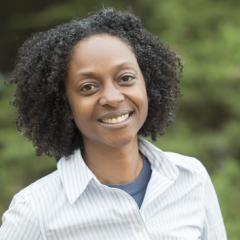Fellows' Thoughts on COP20 in Lima, Peru
In December 2014, several Switzer Fellows attended the COP20 events in Lima, Peru. In addition to the Fellows who offer their thoughts below, Alex Eaton (tweeted @Albeeat), Tracey Osborne, Doreen Stabinsky, and Reed Schuler also attended.
2014 Fellow Sarah Lupberger, MEM at Yale School of Forestry & Environmental Studies:
The most powerful and inspiring parts of COP20 for me actually occurred outside the negotiations themselves. Because of the restricted access within the COP20 venue, many indigenous peoples who live in the most biodiverse and carbon-intensive forests in the world were unable to participate in the negotiations themselves. Instead, indigenous and community activists from all over Latin America met in the Parque de la Exposición in downtown Lima to share ideas, coordinate efforts, and build large-scale strategies. Thousands of people filled the streets on the second Wednesday to advocate for progress around climate justice principles. And at the Lima Art Museum, indigenous activists and leaders gathered to give testimonies of how climate change impacts their communities. These stirring testimonies included both the inspiring bottom-up actions these activists are implementing as well as heartbreaking accounts of how the damages of large-scale extractive economies are often suffered by society’s most marginal groups. If we really want an equitable agreement in Paris next year, we need to make sure these marginalized voices are heard by the powerful decision-makers within the COP20 venue.
Editor's Note: Sarah also ran the following event:
Community Forestry in Latin America
A Yale F&ES Workshop
Friday, December 5th, 2014
Swissotel
Lima, Peru
An international workshop on ‘Community Forestry in Latin America’ will take place in Lima, Peru on Friday, December 5th, 2014 as a parallel event during the 20th Conference of the Parties to the UN Framework Convention on Climate Change (UNFCCC) and the Global Landscapes Forum. The workshop is organized by the Governance, Environment & Markets Initiative at Yale University (GEM) with sponsorship from the Climate and Land Use Alliance.
The workshop will convene scholars, policy-makers, practitioners, and stakeholders from a variety of fields and disciplines to examine how a selection of strategies can be used to support, design, and disseminate effective community forestry to multiple global regions. An anticipated outcome of the workshop includes a practitioners manual for strategies for the dissemination of community forestry.
She also helped put together a presentation at the GLF that featured some of the research she conducted with Prof. Ben Cashore from Yale on securing rights as a climate change mitigation strategy.
Dave Kramer, EcoLogic Development Fund:
I was only involved with the Global Landscapes Forum (#COP20GLF and #ThinkLandscape) and honestly barely gave much thought to the actual climate talks going on down the road. The GLF was a huge side event (~1700 people), but it was the main event for me and EcoLogic. I just attended on EcoLogic's behalf, no speaking, though I would have liked to!
The outcome statement, "Official Outcome Statement of the 2014 Global Landscapes Forum, held at the sidelines of the UNFCCC COP20 in Lima, from 6-7 December. More than 1,700 world leaders, policy makers, researchers and representatives from civil society, the private sector and media met in Lima to discuss the future of land use sectors in a new climate agreement. Nine key messages form the basis of their recommendations."
Here are some thoughts and reflections:
I had the chance to mentor a young Colombian woman named Xiomara Acevedo - she and I were matched through a Youth-Professional mentoring program set up by the Center for International Forestry (CIFOR) and the International Forestry Students Association (IFSA). That experience was very impressive and humbling. A lot like my experience with Switzer Fellows in general.
The focus on landscapes seemed to gain new momentum, especially as climate-smart landscapes
Coincided with release of this paper for which I was lead author (not peer reviewed, FYI), "Bridging the Gap from the Local to the Landscape in Northern Honduras: Hybrid Conservation and Development Collective Impact Approach."
CEO of Unilever, Paul Polman, delivered the opening keynote. His message was clear, that business must lead in partnership with other sectors and not be held back by short-term quarterly reporting and the accompanying limitations / dereliction of duty as regards the role of business in society at large, beyond providing value to shareholders alone. Mr. Polman spoke of the “inconvenient facts” related to climate change and corporate responsibility up and down the agriculture supply chain.
World Resource Institute's Global Forest Watch had a starring role, and I predict it will become even more relevant globally during the course of 2015. From their website: "Global Forest Watch (GFW) is a dynamic online forest monitoring and alert system that empowers people everywhere to better manage forests. For the first time, Global Forest Watch unites satellite technology, open data, and crowdsourcing to guarantee access to timely and reliable information about forests. GFW is free and follows an open data approach in putting decision-relevant information in the hands of governments, companies, NGOs, and the public."
A lot of talk about power and rights – where people have been sandwiched by negative consequences of land grabs for conservation, producing “conservation refugees” and on the other hand by extractive industry / megaprojects on the other. For REDD+, starting from a pure carbon perspective is wrong as it prevents the ability to talk about rights - suggested that we try to figure out tenure and power and then see if it trickles down to carbon.
My personal favorite speaker (his analogies were amazing), and I had a chance to speak with him one-on-one, was Chairman of the National Coordinating body of Indigenous Peoples of Panama, Cándido Mezúa Salazar.
Additional Resources
Dave Kramer's blog post for EcoLogic website: "Balu Wala" and Collective Momentum for Landscape-level Coservation




